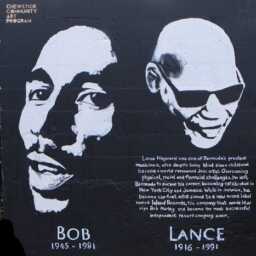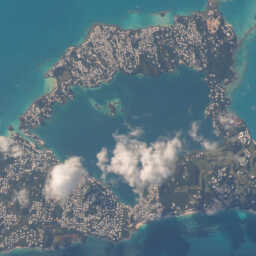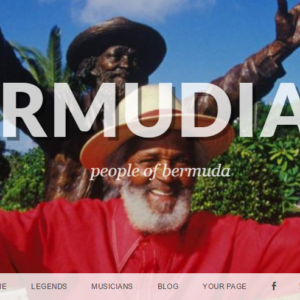Bermudian English is a unique dialect spoken on the picturesque island of Bermuda in the Atlantic Ocean. Influenced by British English, African languages, and Caribbean accents, Bermudian English features distinct pronunciation, vocabulary, and grammar. It reflects the island’s rich cultural heritage and diverse population, with traces of West African, Portuguese, and Native American linguistic influences. From its melodic cadence to its colorful expressions, Bermudian English embodies the island’s vibrant identity and sense of community, serving as a linguistic hallmark of Bermuda’s captivating charm.
Wikipedia
Bermudian English is a regional dialect of English found in Bermuda, a British overseas territory in the North Atlantic. Standard English is used in professional settings and in writing, while vernacular Bermudian English is spoken on more casual occasions. The Bermudian dialect began to develop following settlement in the early 17th century and retains traits of Elizabethan English.
Casual observers tend to have difficulty in placing the Bermudian dialect, as it differs from those that are clearly British, American, or Caribbean; they also note that the accent tends to vary between individuals. To Americans, it sounds slightly English, while those from the British Isles find it more American.source: en.wikipedia.org/wiki Bermudian English
Categorisation, Phonology, Grammar
Categorisation
Bermudian English has been called “one of the most severely underresearched varieties of English”. It primarily shows a mixture of traits typical of British English and American English, and is generally classified as a form of American (rather than Caribbean) English. The most detailed scholarly study of Bermudian English, in 1933, stated that this type of speech “would create least remark, if indeed any, between, say, Norfolk, Virginia, and Charleston, South Carolina” (Bermuda was settled as an extension of the Colony of Virginia, and Charleston and the Carolina Province were settled from Bermuda, and Bermuda retained close links with both into the 19th century, although the start of its tourism industry in the latter 19th century would see its transport connections move to the North East of the United States, from where most of its visitors continue to come; within the British Empire, Bermuda was administered not as part of the British West Indies but with the continental colonies to its west as part of British America until 1783, then as part of British North America, with closest ties to the Maritimes, until left out of the 1867 Confederation of Canada); Bermudian actor Earl Cameron noted that because the Bermudian accent sounded American, he was able to land a speaking role in London’s West End in 1942.] Large scale West Indian immigration to Bermuda, especially Sandys and Pembroke parishes, began with the expansion of the Royal Naval Dockyard (as a result of the lack of cheap, unskilled labour in Bermuda) at the turn of the twentieth century, and affected the dialect of certain demographic groups. Contemporary printed media record that West Indian agricultural labourers had also immigrated in the closing decades of the nineteenth century, when their waning maritime industries forced Bermudians to explore other industries, including agriculture, which was highly stigmatised resulting in a reliance on imported labour, primarily from the Portuguese Atlantic islands. Bermuda’s eastern parishes (Devonshire, Smith’s, Hamilton, and St. George’s) were primarily engaged in shipbuilding, with most farming (or gardening, as Bermudians term it) taking place in the central and western parishes (Sandys, Southampton, Warwick, and Paget). Consequently, in certain aspects of vocalization, some Bermudian English dialects are close to some versions of Caribbean English, and some would bracket all these varieties to the broad region of the “English-speaking West Indies”. Azorean Portuguese has also impacted on Bermudian English as a result of immigration since the 1840s. Many Bermudians, mostly young men, with no known West Indian or Portuguese forebears adopt West Indian or Portuguese accents when speaking humorously or derisively.
Many West Indian workers immigrated to Bermuda during the 20th century, starting with hundreds of labourers brought in for the expansion of the Royal Naval Dockyard at the West End at the start of the century. Many others immigrated later in the century, settling mostly in Pembroke Parish and western Devonshire Parish, north of the City of Hamilton, and the “back of town” (of Hamilton) dialect and the English spoken by many blacks at the West End consequently reflects this. The West End also absorbed large numbers of civilian shipwrights and other workers from Britain who were employed at the dockyard until it was reduced to a base in 1951. The central parishes also absorbed considerable numbers of white immigrants from Britain and elsewhere, especially in the years following the Second World War (when the local government loosened immigration laws to encourage white immigration to counter the black immigration from the West Indies), speaking various varieties of Southern England English, Northern England English, and Scots, et cetera. The central parishes were also where most immigrants from Portuguese territories since the 1840s have settled, and many Bermudians in this area especially speak a Portuguese-influenced Bermudian English as a badge of pride, and most Bermudians without Portuguese ancestry can affect this way of speaking. The East End of Bermuda, which became increasingly cut off from investment and development after the capital moved from St. George’s to Hamilton in 1815, has seen the least immigration during the course of the 20th century, with the least effect on the way English is spoken there, though the introduction of motor vehicles in 1948 has led to considerable spread of previously more isolated populations throughout Bermuda. The English of the St. David’s Islanders, while often derided, is generally perceived as the most authentic form of Bermudian English.[original research?]
Phonology
The accent of Bermudian English has distinctive features in terms of tone, rhythm, and vowel pronunciation.
- In Bermudian English, the phenomenon known as “Th fronting” can occur in the digraph “th.” This means that the sounds /θ/ (as in “thin”) and /ð/ (as in “then”) can be pronounced as /f/ and /v/ respectively in certain contexts. However, it is important to note that this variation can vary among individual speakers and may not be a consistent feature throughout the Bermudian dialect.
- Tone: The accent of Bermudian English is often described as melodic and smooth. Bermudian speakers tend to use a rising intonation in phrases, meaning that the pitch of their voice rises towards the end of the sentence. This can give a sense of friendliness and politeness in communication.
- Rhythm: The rhythm of Bermudian English is distinct and can be perceived as more relaxed and leisurely compared to other varieties of English. Pauses between words and phrases tend to be longer, contributing to a slower and cadenced rhythm in speech.
- Lengthened vowels: Vowels in Bermudian English are often pronounced with an extended duration compared to other varieties of English. This means that vowels are pronounced with a longer length, giving them a clearer and more distinct sound.
- Pronunciation of “a”: The vowel “a” in words like “bath” and “dance” is often pronounced as a variation of “ah” or “aw”. For example, “bath” may sound more like “bahth” and “dance” like “dahns”.
- Pronunciation of “r”: Bermudian English, like many other varieties of British English, is non-rhotic. In Bermudian English, the “r” at the end of words or before a pause tends to be vocalized or even omitted, similar to other Caribbean English accents. For example, “car” may sound more like “cah” or “ca”.
- “R” Vocalization: In certain positions within a word, the “r” sound may be vocalized or replaced with a vowel. For instance, “bird” may sound more like “buhd.”
- “H” Aspiration: The letter “h” at the beginning of a word is pronounced with a slight aspiration or can be completely silent. For example, “house” may be pronounced as “haʊs” or even “ʊs.”
- Vowel Glide: Some vowels in Bermudian English may glide towards other vowels. For instance, the sound “i” in words like “fight” may sound more like “e.”
- Vowel Shortening: Occasionally, vowels in Bermudian English can be shortened or reduced. This means that vowels may sound shorter than they would in other varieties of English. For example, “later” may sound more like “lay-tuh.”
- Intervocalic “R” Retention: Unlike Standard British English, Bermudian English retains the pronunciation of “r” in intervocalic positions. For example, “carrot” would be pronounced as “ka-rut.”
The dialect’s most evident characteristic is a variation in letter/sound assignment. The switching of [v] and [w], characteristic of many dialects in Southern England during the 18th and 19th centuries, and of [d] and [dʒ] (similarly to the dialects of English speakers of Gaelic heritage), when combined with a front vowel, can both be seen in the title of a humorous glossary, Bermewjan Vurds (Bermudian Words). The traditional Bermudian pronunciation of the word “boy”, used in preference to the term “guy”, was originally pronounced in the same way as in Newfoundland: bye. As in Newfoundland, when the word is used similarly, Bermudians still use this pronunciation, but otherwise generally now say boy when speaking of a boy. Bermuda was administratively part of continental British America ’til the 1783 independence of the colonies that became the United States of America, and thereafter was part of British North America, within which it was grouped with the Maritimes until 1867, at which point, as an Imperial fortress, it was left out of the formation of the Canadian dominion and remained under the administration of the British Government, which increasingly grouped Bermuda for convenience with the British West Indian colonies (usually termed as “the West Indies and Bermuda” or “the Caribbean and Bermuda”).It is unclear whether any similarities between Bermudian English and Newfoundland English date from this period, or pre-date it. The use of [æ] and [ɛ] is interchangeable and vowels are often elongated. [θ] and [ð] turn into [f] and [v], respectively. Bermudian is also non-rhotic, like British English or New York accent. There’s a simplification of codas like ‘best’ and ‘soft” become bes and sof. Coda [ɫ] is semivocalized to [w].
Grammar
- Verb Conjugation: Bermudian English generally follows the standard English verb conjugation patterns. Verbs are inflected to indicate tense, aspect, and agreement with the subject. For example, “I walk,” “He walks,” “They walked.”
- Prepositions: Bermudian English employs prepositions in accordance with standard English usage. These prepositions are used to indicate relationships between words and phrases in a sentence. For instance, “in,” “on,” “at,” “with,” “to,” etc.
- Articles: The definite article “the” and the indefinite articles “a” and “an” are used in Bermudian English in the same way as in standard English. For example, “the cat,” “a dog,” “an apple.”
- Noun Pluralization: Nouns in Bermudian English are pluralized by adding “-s” or “-es” to the singular form, depending on the phonetic ending of the noun. For example, “cat” becomes “cats,” “box” becomes “boxes.”
- Pronouns: Bermudian English employs the same set of pronouns as standard English, including personal pronouns (e.g., I, you, he, she, it, we, they), possessive pronouns (e.g., mine, yours, his, hers, ours, theirs), and reflexive pronouns (e.g., myself, yourself, himself, herself, itself, ourselves, yourselves, themselves).
- Sentence Structure: Bermudian English generally follows the subject-verb-object (SVO) sentence structure, which is common in English. For example, “She eats an apple.”
- Verb Tenses: Bermudian English utilizes the same verb tenses as standard English, including present, past, and future tenses, as well as perfect and progressive forms. For example, “I have eaten,” “They will be arriving.”
- Question Formation: Questions in Bermudian English are typically formed by inverting the subject and the auxiliary verb. For example, “Do you like ice cream?” or by using question words such as “who,” “what,” “where,” “when,” “why,” and “how.”






















![Chewstick Open-Mic Jam Session [28.04.24]](https://bermudians.com/wp-content/uploads/2024/05/chewstick-shine-hayward-300x300.png)
















Connect with Bermudians!
Comments